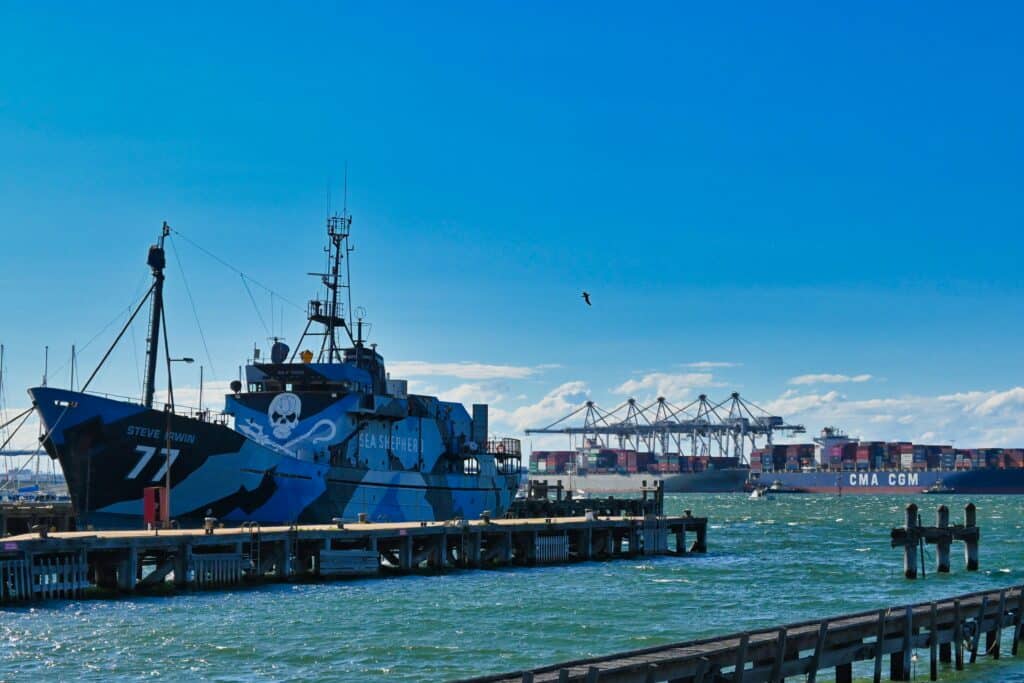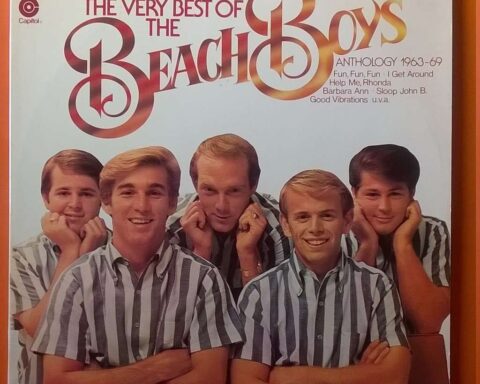He is one of the world’s best-known environmental activists. For decades, Paul Watson has sailed the seas and oceans to protect marine ecosystems and spread the values of his Sea Shepherd Conservation Society. Often at the risk of his own life and safety.
An environmental hero to some, an eco-terrorist to others: although Paul Watson’s muscular methods are disputed, it is hard to ignore the benefits of his actions for marine ecosystems and the cause defended by his association. Now aged 74, with immaculate hair and beard, the activist continues to work alongside his teams to protect the flora and fauna of our oceans. Over the decades, he has become a leading figure in environmental activism.
From Greenpeace to Sea Shepherd
Born in Toronto on 2 December 1950, Paul Watson was connected to nature from an early age, tracking trappers to destroy their traps. At the age of 18, he joined the Canadian Coast Guard, where he served on weather ships and sea rescue hovercraft, before joining the merchant navy.
Rebellious and committed, he took part in demonstrations and was involved in the emergence of the environmental organisation Greenpeace. For several years, Paul sailed and campaigned. Until one famous day in 1975, when his eyes met those of a harpooned sperm whale killed by a Soviet whaler. The ecologist promised to protect the ocean, which makes up 71% of the Earth’s surface. In 1977, he was expelled from Greenpeace because of a disagreement between the philosophy of non-violence advocated by the NGO and his ambition to take more direct action.
Voir cette publication sur Instagram
That same year, he founded Sea Shepherd Conservation Society. The organisation’s main focus is whale poaching, but it is also committed to protecting seals, sharks, dolphins and other endangered marine animals, as well as industrial overfishing.
Contested methods
With a number of boats and determined volunteers, the NGO quickly made a name for itself with its large-scale actions and a crew that did not hesitate to collide with factory ships to stop them in their tracks. Always ensuring the safety of their members, and in the context of illegal fishing, says the association. These divisive methods have led to numerous court cases against Sea Shepherd and Paul Watson. Like a militant pirate, sailing under his black flag adorned with a skull and crossbones and the name of the NGO, he has become the environmentalist to kill, dividing his life between the sea and arrests.
Vegan, misanthropic, antispeciesist (a movement that puts all species, including humans, on an equal footing)… Paul Watson has an iron grip on his association and insists that you have to be prepared to die to defend such a cause. ‘To place yourself on the same level of importance as a whale, a dolphin, a walrus or a seal requires a degree of humility and perception that few can conceive’, says Paul Watson on the NGO’s website.
Voir cette publication sur Instagram
While the activist has the support of celebrities such as Pierre Niney and Brigitte Bardot, the groups Tryo and Shaka Ponk and even the city of Paris, which granted him honorary citizenship at the end of the year, politicians and environmentalists have denounced his actions as counter-productive.
‘I invaded Soviet Siberia in 1981 to denounce Russia’s illegal whaling and, in 1986, I organised the sabotage of half the Icelandic whaling fleet and the cessation of whaling in Iceland for 17 years. I then confronted Norway and sank four Norwegian whalers. Finally, after ten years of confrontation with the Japanese whaling fleet in the Antarctic, these operations led to its withdrawal from the Southern Ocean whale sanctuary’ describes Paul Watson. Leviathan, Sparrow, Migaloo, Blue Rage, Waltzing Matilda, Requiem, Jodari… Dozens of operations have been carried out by Sea Shepherd, saving thousands of cetaceans and fish.

A few years ago, internal divisions within Sea Shepherd Global led Paul Watson to create Sea Shepherd Origins. The Sea Shepherd branches in France, the UK, Brazil, Hungary and New Caledonia signed the Origins charter, while the other branches (Australian, Chilean, Spanish, Irish, Icelandic, Italian, Dutch and Portuguese) joined forces with the American branch. At the same time, he founded the Captain Paul Watson Foundation and set up operations in countries that had not joined Origins.
Arrested on 21 July 2024
‘We have come to arrest Paul because of an arrest warrant issued by Japan’, declared the Danish federal police on 21 July 2024, who had come to collect the captain on their flagship, the M/Y JOHN PAUL DEJORIA. Arrested in Greenland, Paul Watson, who was preparing to intercept a new Japanese whaling factory ship, was removed from his vessel because of his actions against Japanese whaling in the Antarctic. An international arrest warrant was issued for him in 2012.
The founder of the Sea Shepherd movement was detained in Nuuk and was not extradited to Japan, where he faced up to 15 years in prison.
Voir cette publication sur Instagram
‘We’re trying to make up for the shortcomings of these governments, which are failing to live up to their responsibilities, particularly towards future generations and in relation to all the laws and treaties they have signed up to’, said Lamya Essemlali, President of Sea Shepherd, in an interview on France Inter on 14 December. Defending the NGO’s mission to protect marine biodiversity, she quoted Paul Watson himself: ‘If life in our oceans falters, humanity will falter, and if the oceans die, humanity will die, because we cannot survive on this planet with a dead ocean.’
Sea Shepherd Conservation Society claims to have saved more than 5,000 whales from Japanese harpoons.
Read also: The Poilâne family of bakers: flour in their blood
Featured photo: © Paul Watson Foundation















